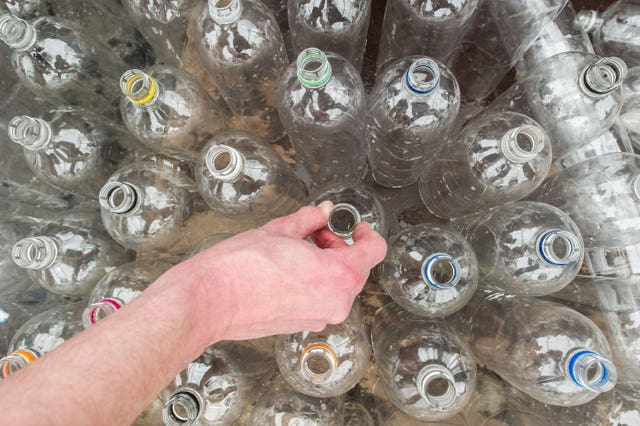Lorna Slater has called on the UK Government to change course on the deposit return scheme (DRS), as she said Scottish ministers will have to assess if they can make it “work”.
Scottish Secretary Alister Jack wrote to the Scottish Government on Friday, granting the exemption to the Internal Market Act needed for the scheme to operate, but said the inclusion of glass could risk a “permanent divergence” between the UK and Scotland.
In a statement where she repeatedly attacked the UK Government’s approach to devolution, Lorna Slater said: “If the UK Government had given us the full exclusion that we had sought, then I would be here today setting out all the detailed steps that we are taking ahead of go-live date next March.”
“But instead, we are now being forced to examine whether the deliberate sabotage by the UK Government leaves us something we can make work.”

Ms Slater said: “We will need some time to go through the detail of the UK Government decision and conditions and I will update Parliament on next steps.
“There is still a win-win opportunity for the UK Government if it immediately reverses its 11th hour decision and enables Scotland to pave the way for the all-in DRS scheme, including glass, that its own analysis concluded was the best option. That is what it should do.”
Ms Slater challenged the UK Government to show how a similar English scheme would operate, before describing the union as “broken”.
“Scotland deserves so much more than the broken pieces of devolution. We deserve always to get the Governments we vote for and the polices we need.
“We should not have to put up with Westminster interfering with our Parliament and sabotaging important policies to suit their own agenda.
“I look forward to a different future where we can have all the powers we need – right here in this Parliament – to deliver for the people of Scotland, to protect the environment and build a stronger, fairer economy.”
Tory MSP Maurice Golden, who has led on the scheme for his party, said the statement should have been delivered by independence minister Jamie Hepburn, “because it was solely designed to pick a fight with the UK Government”.
He added: “The minister has come to Parliament today not to update us on deposit return but to indulge in an anti-UK rant.
“She would rather pick a fight with the UK Government than support a scheme that works for everyone.
“She has traded her environmentalism for nationalism.”
Responding, Ms Slater described Mr Golden’s comments as “disingenuous”, adding that the decision of the UK Government was “out of my hands” and “we have done everything we can possibly do”.
Sarah Boyack, Scottish Labour’s net-zero spokeswoman, said Ms Slater was making the statement about devolution to “divert attention from the utter mismanagement and the uncertainty her scheme has caused”.
Former minister, turned Scottish Government critic, Fergus Ewing urged the minister to withdraw her “false and disingenuous claim” that 600 million glass bottles would be littered if the scheme does not go ahead.
Responding, Ms Slater said: “The numbers that the member quotes, the 600 million glass bottles is the estimated number of glass bottles in use in Scotland and are therefore included in the deposit return scheme.
“They would be in scope with the deposit return scheme and therefore would be prevented from being littered by being included in that scheme.”
A spokesman for the UK Government said: “The Government remains unwavering in its commitment to improving the environment, while also upholding the UK’s internal market.
“The drinks industry has raised concerns about the Scottish Government’s deposit return scheme differing from plans in the rest of the UK, resulting in the Scottish Government reviewing and pausing their scheme earlier this year.
“We have listened to these concerns and that is why we have accepted the Scottish Government’s request for a UK Internal Market (UKIM) exclusion on a temporary and limited basis to ensure the Scottish Government’s scheme aligns with planned schemes for the rest of the UK.
“Deposit return schemes need to be consistent across the UK and this is the best way to provide a simple and effective system.
“A system with the same rules for the whole UK will increase recycling collection rates and reduce litter – as well as minimise disruption to the drinks industry and ensure simplicity for consumers.”






